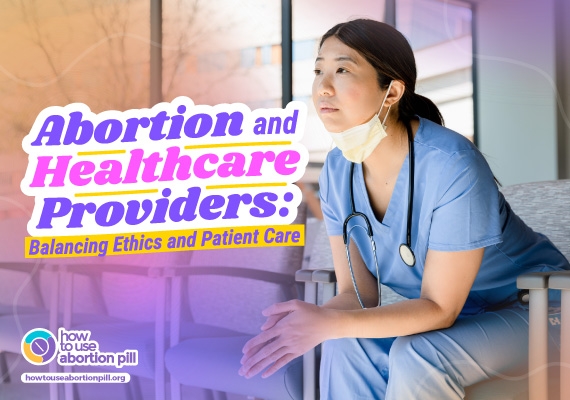Abortion remains an emotionally charged issue worldwide. Healthcare providers, who are at the forefront of reproductive healthcare, often find themselves navigating a complex landscape of ethical dilemmas, legal regulations, and the need to provide patient-centered care. In this blog, we will explore the intricate relationship between healthcare providers and abortion, focusing on aspects of ethical dilemmas, ethical principles, and the responsibilities of healthcare providers.
Ethical principles and dilemmas
Healthcare providers involved in abortion care face a range of complex ethical dilemmas that require careful consideration and navigation. These dilemmas revolve around principles like patient autonomy, beneficence, non-maleficence, justice, conscientious objection, communication, and privacy. Addressing these dilemmas often demands a delicate balancing act, where providers must prioritize the best interests and well-being of their patients while respecting their own values.
For example, one of the central ethical principles in healthcare is respecting a patient’s autonomy—their right to make informed decisions about their own body and medical treatment. In abortion cases, healthcare providers may grapple with situations where a patient’s decision conflicts with their own personal beliefs. In such a scenario, a provider may find it ethically challenging to do their job.
Similarly, healthcare providers are bound by the principles of beneficence (doing good) and non-maleficence (avoiding harm). In abortion care, they must balance the potential benefits to the patient’s physical or mental health with the ethical obligation to avoid causing harm. Determining what constitutes harm can be ethically complex.
Then there is the principle of justice which involves treating patients fairly and equitably. Healthcare providers may face ethical dilemmas related to the availability and accessibility of abortion services. In some regions, legal and logistical barriers may limit access to safe abortion, creating disparities in healthcare. Providers may grapple with questions of justice when they cannot offer a service due to restrictive laws or institutional policies.
Equally important is the issue of privacy and confidentiality. Abortion is often a deeply private matter, and maintaining patient privacy and confidentiality is paramount. Ethical dilemmas may arise when providers must balance their duty to protect patient information with legal requirements, such as mandatory reporting in cases involving minors or certain medical complications.
Responsibilities of healthcare providers
In the face of such dilemmas, healthcare providers can look for guidance in the ethical principles discussed above as well as the standards of the medical profession. These principles and standards assign a range of responsibilities to healthcare providers for abortion care, including respecting patient autonomy, ensuring informed consent, protecting privacy and confidentiality, providing compassionate care, addressing cultural sensitivities, and, when necessary, making referrals to ensure access to safe and legal abortion services. Balancing these responsibilities can be challenging, but it is essential to provide ethical and patient-centered care in this complex and sensitive area of healthcare.
If we talk about patient autonomy, healthcare providers have a fundamental responsibility to recognize the patient’s right to make decisions about their own body and medical care; and respect that right. In the context of abortion, providers should ensure that patients have access to comprehensive and unbiased information about their options, risks, and benefits. They must also support the patient’s right to make an informed choice, whether it is to proceed with an abortion or explore other alternatives.
At the same time, providers have a duty to provide care without discrimination based on factors such as age, race, gender, sexual orientation, socioeconomic status, or personal beliefs. Discrimination or judgmental attitudes can hinder access to safe abortion care and compromise the ethical principles of justice and beneficence.
Equally crucial is informed consent. Healthcare providers must obtain informed consent from patients before performing an abortion. This process involves explaining the procedure, potential risks, and alternatives to the patient, ensuring they have all the information needed to make a decision. Providers should also answer any questions and address concerns the patient may have.
Given the emotional and psychological dimensions of abortion, healthcare providers should approach abortion care with compassion and empathy. They should create a safe and non-judgmental environment where patients can express their feelings and concerns. This is vital to providing patient-centered care. Being culturally sensitive and aware of the diverse backgrounds and beliefs of their patients helps in fulfilling this responsibility. Abortion can carry significant cultural, religious, and social implications, and providers should be prepared to address these sensitively and respectfully.
Lastly but most importantly, in cases where a healthcare provider cannot perform an abortion due to the dilemmas they face, they have a responsibility to refer patients to colleagues or facilities where the procedure can be safely performed. Ensuring access to care while respecting provider beliefs is a critical ethical balance.
Continuing to learn
Dealing with dilemmas in practice is easier said than done. Every case is different with its own nuances; and requires different sets of skills and knowledge. One way to handle such situations is by staying informed about the latest developments in abortion care, including changes in laws, medical advancements, and best practices. Ongoing education helps ensure that patients receive the most up-to-date and evidence-based care and that healthcare providers do their job as best as possible.
If you are a healthcare provider (or know someone who is) and are interested in keeping yourself up-to-date with abortion information, you can take a look at the e-learning section of our website. You can find courses that will give you the knowledge and skills as well as the language to provide abortion care and support to your patients that fit not just the professional standards but also basic humanity.
In case you have more questions, you can also reach out to us via our website and social media channels.
